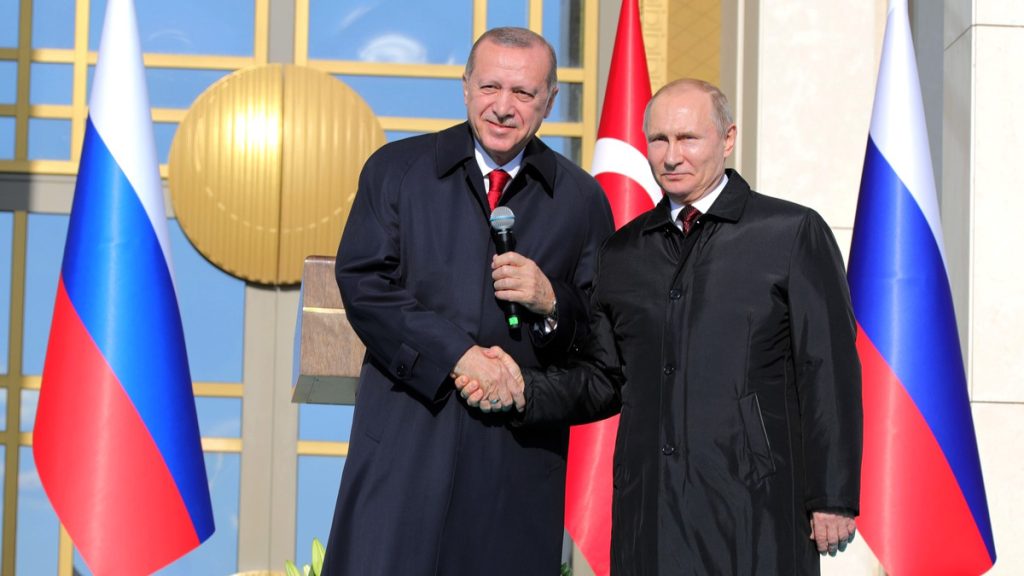On April 27, 2023, Russian President Vladimir Putin praised Russia’s growing rapprochement with Turkey on economic and energy matters. Putin made these comments at a virtual ceremony alongside Turkish President Tayyip Erdogan where they celebrated the launch of Turkey’s first nuclear power plant.
Rosatom, Russia’s state nuclear energy company, was the entity responsible for constructing the Akkuyu nuclear power plant located in Turkey’s southern Mersin province.
“This is a flagship project,” Putin declared at the virtual conference. “It brings both mutual economic benefits and, of course, helps to strengthen the multi-faceted partnership between our two states.”
Putin proclaimed that Akkuyu is “the largest nuclear construction project in the world.” In building this nuclear plant, Putin believes Turkey will not have to rely so much on Russian natural gas in the future.
“But Turkey will enjoy the advantage of a country that has its own nuclear energy, and nuclear energy, as you know, is one of the cheapest,” he continued.
Erdogan gave his thanks to Putin for the Russian state’s assistance in building the Akkuyu plant. The Turkish president said: “We will take steps to build a second and a third nuclear power plant in Turkey as soon as possible.”
This recent development in Russo-Turkish relations proves yet again the age-old axiom that geopolitics makes strange bedfellows. Historically, Russian relations with Turkey have been fraught. In both of the country’s imperial pasts they had repeatedly clashed with one another in the Russo-Turkish wars (Russo-Ottoman wars) throughout the 16th and 20th centuries. Imperial Russia got the better of these conflicts as it emerged as a major power in European affairs, while Ottoman Turkey’s influence declined precipitously during this period.
In the present, Turkey is an ostensive member of the North Atlantic Treaty Organization (NATO), a military alliance that is openly hostile to Russia. However, Turkey has started hedging its geopolitical positions lately. Turkey was at the center of a geopolitical controversy in 2017 after it purchased Russian-made S-400 anti-aircraft missiles. Such a move motivated the US to remove Turkey from the F-35 fighter jet program. In addition, the US sanctioned the Turkish arms sector for Turkey’s S-400 purchase.
In a similar vein, Turkey has not imposed sanctions on Russia after it launched its “special military operation” against Ukraine on February 24, 2022. Moreover, Turkey partnered with the United Nations to forge ahead with a deal that allowed Ukraine to continue conducting grain exports via a safe corridor in the Black Sea. In sum, Turkey is demonstrating a willingness to discard historical grievances with Russia to cooperate with it on numerous issues.
On Russia’s end, it’s geopolitical interactions with Turkey are in line with the Primakov Doctrine, a foreign policy that was put forward by former Russian Prime Minister (1998-1999) and diplomat Yevgeny Primakov. Central to the Primakov Doctrine is Russia’s commitment to push for a multipolar world that challenges US hegemony by forging alliances with China and India.
Moreover, this doctrine calls for Russia to exploit contradictions within NATO to undermine its influence. For example, Turkey stands out as the most authoritarian country within NATO that also has a strong ethno-religious ethos that lies in stark contrast to the secular liberal inclinations of the overwhelmingly majority of NATO member states. Russia, which has experienced its fair share of regime change efforts and other forms of Western subversion, will undeniably look to find ways to undermine NATO by exploiting its weakest link in Turkey.
Indeed, Russia has butted heads with Turkey in Libya, as evidenced by its support of Libya’s Marshal Khalifa Haftar against the Turkish-backed General National Congress, and in the Nagorno-Karabakh conflict, where Russia has made sure to halt further encroachments by the Turkish-backed forces of Azerbaijan. However, this does not prevent Russia from continuing to exploit contradictions within NATO and cooperate with Turkey in a way to limit the US’s influence.
As unipolarity becomes a distant memory, one can expect Russo-Turkish cooperation to intensify, especially when it comes to matters concerning the containment of US influence in the Eurasian space.
